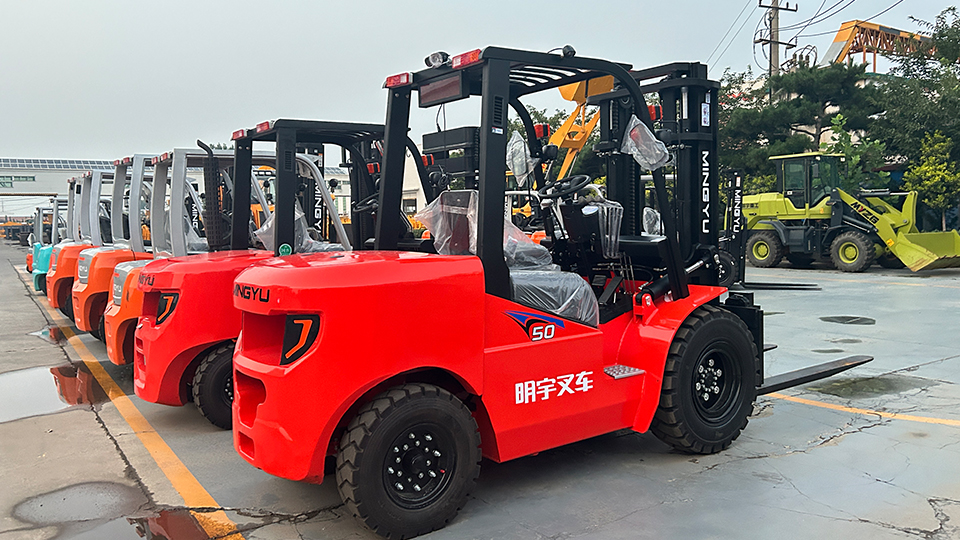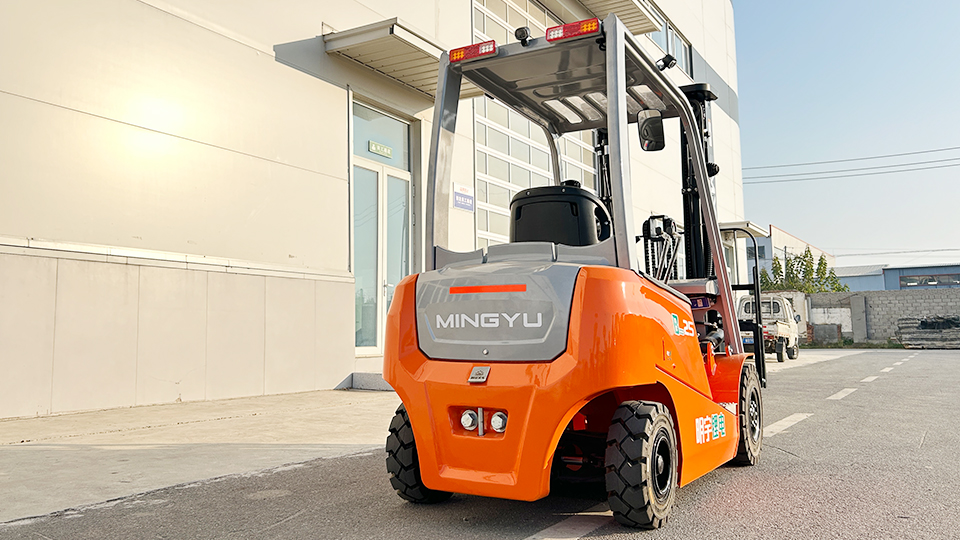
The cost of forklift certification for an operator is highly variable, ranging from $50 to over $500 depending on the training format and provider, but most frequently falls between $150 and $300 for a full, compliant, in-person course.
The price is directly influenced by the requirement set by the Occupational Safety and Health Administration (OSHA) in the United States (or comparable regulatory bodies like CSA in Canada) that certification must include three distinct components: formal instruction, practical training/demonstration, and a final performance evaluation.

The largest determining factor in cost is how these three components are delivered:
|
Training Format |
Average Cost Range (USD) |
Components Included |
Primary Users/Target |
|
Online-Only (Theory) |
$50 - $100 |
Formal Instruction (Classroom/Video) and Written Exam. |
Experienced operators needing recertification or those whose employer provides the hands-on evaluation. |
|
In-Person / Hybrid (Full) |
$150 - $300 |
Formal Instruction, Hands-on Training, and Practical Evaluation. |
Beginners and individuals seeking an all-inclusive certification. |
|
Specialized Training |
$300 - $500+ |
Specialized equipment (e.g., reach trucks, telescopic handlers) and longer duration. |
Operators needing certification for Class VII or specialized Class I/II lifts. |
|
Employer-Provided |
$0 (to employee) |
Full OSHA-compliant training (all 3 components) provided internally. |
New hires or existing employees in large warehouse/industrial settings. |
The Technical Breakdown of Forklift Certification Cost
The cost structure of forklift certification is not just a commercial pricing model; it is a direct reflection of the resources required to meet non-negotiable regulatory standards, primarily set by OSHA 29 CFR 1910.178(l). A compliant certification cannot be purely a theoretical endeavor; it demands physical equipment, dedicated space, and a qualified instructor, all of which contribute to the final price.
1. The Cost of Formal Instruction (The "Classroom")
Formal instruction covers the theoretical knowledge required to safely operate a powered industrial truck (forklift). This is the most standardized and thus the cheapest component of the training.
|
Delivery Method |
Typical Cost |
Included Resources |
Cost Efficiency |
|
Online/Computer-Based |
$50 - $100 |
Interactive modules, videos, written manuals, and a final written exam. |
Highest. The course is self-paced, scalable, and eliminates instructor/facility overhead. |
|
In-Person/Live Classroom |
Included in full price |
Live lectures, Q&A sessions, physical training materials. |
Lower. Requires instructor pay, facility rental, and fixed time schedules. |
导出到 Google 表格
Technical Compliance Focus: The formal training ensures the operator understands core safety principles, including:
Vehicle capacity and stability (the Stability Triangle concept).
Pre-operation checks and maintenance requirements.
Safe handling of different load types.
The specifics of the fuel source (LPG, battery charging, diesel).
Workplace hazards (ramps, floors, restricted areas).
2. The Cost of Practical Training and Evaluation (The "Hands-On")
This is the most expensive and legally critical component of the certification process, as it directly involves the use of heavy machinery. The hands-on training and final performance evaluation must be conducted under the direct supervision of a qualified trainer.
|
Component Cost Factor |
Technical Rationale for Cost |
Cost Impact |
|
Equipment Access |
Training facilities must own, maintain, and insure the actual forklift(s) used for training. Maintenance, fuel/power, and depreciation are factored into the course fee. |
High. This is the primary difference between cheap online courses and complete in-person courses. |
|
Qualified Trainer Salary |
OSHA mandates that the trainer must have the requisite knowledge, training, and experience to train operators and evaluate their competence. This is a specialized, salaried professional. |
High. Pays for the instructor's expertise and dedicated time for one-on-one evaluation. |
|
Facility Overhead |
The cost of renting or maintaining a warehouse or dedicated training yard with racks, loads, and obstacles to simulate a real-world environment. |
Medium. Facility size, insurance, and location (especially in urban areas) inflate this cost. |
The Hidden Cost of Online-Only: While an online course may cost $50, the operator is not fully certified until their employer provides or arranges the practical, hands-on evaluation. For an individual without a job, finding a separate, certified facility to perform only the practical evaluation can be challenging and often costs an additional $100 to $200.
Key Factors That Inflate or Reduce Certification Costs
Beyond the core components, several operational and logistical variables significantly affect the final price tag for forklift certification.
3. The Influence of Forklift Class and Complexity
Forklifts are categorized into seven classes based on their power source and design (Classes I-VII). Certification must be specific to the type of truck an operator will use.
|
Forklift Class/Type |
Complexity |
Cost Impact |
|
Classes IV & V (Internal Combustion/Electric Counterbalance) |
Standard warehouse lifts. |
Baseline Cost. Most training centers offer this as the basic package ($$150-$$250). |
|
Classes I, II & III (Electric Motor Narrow Aisle/Pallet Jacks) |
Specialized techniques (e.g., Reach Trucks and Order Pickers). Requires more intricate maneuvering and stability knowledge. |
Moderate Increase. Training is often longer and more focused, pushing the price towards the $300-400 range. |
|
Class VII (Rough Terrain/Telescopic Handlers) |
Highest complexity. Requires knowledge of unstable surfaces, extreme load dynamics, and often requires multiple days of training. |
Highest Cost. Specialized training can reach $500 or more due to the high cost of equipment and specialized instructor expertise. |
导出到 Google 表格
4. Recertification and Refresher Training
OSHA mandates that forklift operators must be evaluated at least once every three years. This refresher training is necessary to address any observed deficiencies in the operator's performance, changes in the workplace environment, or a new type of truck being introduced.
Recertification Cost: Because the operator already possesses the basic foundational knowledge, recertification is typically cheaper. Online recertification/refresher courses often cost between $50 and $100. In-person refreshers, which include a new practical evaluation, are generally priced lower than the initial certification, often around $100 to $150.
5. Training Provider and Location Economics
The cost is not uniform across all providers, reflecting differences in overhead and market dynamics:
Private Training Facilities: These companies are in the business of safety training and often charge higher individual rates ($200 - $300) but offer greater flexibility in scheduling and can often perform the complete certification in a single day.
Vocational/Community Colleges: These institutions sometimes offer subsidized or packaged programs that can be more affordable ($150 - $250), but they usually operate on a fixed academic schedule.
Urban vs. Rural Location: Training centers in major metropolitan areas (like Toronto, New York, or Chicago) often charge higher fees due to increased commercial property costs, higher insurance, and higher instructor salaries.
6. Employer-Sponsored Training (The $0 Cost Option)
For the individual operator, the most cost-effective path is often employer-sponsored training. In a compliant operation, the employer is legally obligated to ensure all operators are trained and certified to OSHA standards at the employer's cost.
Cost Efficiency for the Employer: While the cost per operator is incurred by the company, the price can be dramatically reduced through group rates or by implementing an in-house "Train-the-Trainer" program.
Group Discounts: Many external providers offer significant volume discounts, with the per-person cost dropping by 20% to 50% for groups of 10 or more.
Trainer Certification: An employer can send a supervisor or experienced employee to an Instructor/Evaluator course, which typically costs $300 to $500. Once certified, this in-house trainer can certify all other employees, eliminating future external certification fees and saving on operational downtime.
Technical Considerations: Beyond the Dollar Amount
While cost is a primary concern, the technical compliance and quality of the training are paramount, especially given the serious safety risks and high financial penalties associated with non-compliance.
The OSHA Mandate: Certification vs. "License"
It is technically inaccurate to call the certification a "forklift license." A license is typically a government-issued document that grants permission to operate (like a driver's license). Forklift certification is an employer-issued document that attests to the operator's competence in that specific workplace and on that specific type of equipment, following training principles set by OSHA.

The Certification Card: The card received from a third-party training provider serves as proof of training (the formal instruction component). The true, final certification occurs when the employer signs and verifies the practical evaluation, making the employee competent to operate their equipment.
Financial Risk of Non-Compliance
The seemingly high cost of compliant training pales in comparison to the financial risks associated with non-certification.
OSHA Fines: Companies found to be in non-compliance with the training standard (e.g., using uncertified operators or failing to conduct the 3-year evaluations) face substantial fines. A "Serious" violation fine can exceed $16,000, while a "Willful or Repeated" violation can reach $161,000 per violation.
Accident Costs: An accident involving an uncertified operator can lead to catastrophic financial liability for the employer, including medical costs, workers' compensation claims, equipment damage, loss of product, and massive legal fees. The cost of a few hours of compliant training is a minimal investment for risk mitigation.
The Value of Quality Training
High-quality, in-person training often includes elements that justify a higher price:
Specific Hazard Training: Tailoring the practical evaluation to the employer's specific hazards (e.g., working around chemicals, narrow aisles, dock plates, or different floor conditions).
Advanced Load Dynamics: In-depth instruction on complex maneuvers like handling unbalanced loads, stacking in high-rack systems, and using specialized attachments (like drum handlers or paper roll clamps).
In summary, the cost of forklift certification is a variable metric based on the trade-off between convenience and hands-on completeness. While low-cost online options provide the theoretical knowledge for $50-$100, a complete, beginner-level certification that fully satisfies the hands-on requirement will demand an investment of $150 to $300, representing the necessary cost of safety and regulatory compliance.
Name: selena
Mobile:+86-13176910558
Tel:+86-0535-2090977
Whatsapp:8613181602336
Email:vip@mingyuforklift.com
Add:Xiaqiu Town, Laizhou, Yantai City, Shandong Province, China